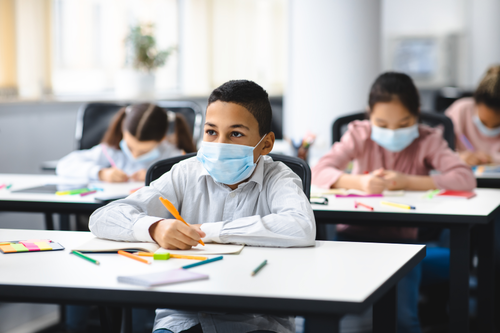Mental health is a top concern for educators and students, state-wide U of M survey reveals

Minnesota educators, families and students agree that addressing student and educator mental health is a top concern, according to a University of Minnesota analysis of the Minnesota Safe Learning Survey (SLS) that was distributed in the winter, spring and fall of 2021. There were more than 53,000 respondents to the three surveys from across Minnesota, and their concerns were clear. “Mental health not only consistently showed up as the most pressing concern of educators, the concern increased over time,” said Katie Pekel, the Principal in Residence at the University of Minnesota.
The SLS was distributed by the Wisconsin-Minnesota Comprehensive Center (WMCC) in the University of Minnesota’s College of Education and Human Development for the Minnesota Department of Education (MDE). The goal of the statewide SLS was to provide a broad picture of how those most impacted by the state’s Safe Learning Plan experienced it.
In addition to mental health concerns, the series of surveys also revealed that respondents feel as though academic learning has increased for K-12 students (compared to the previous school year), as have comfort levels with technology. Student respondents expressed a desire for change with respect to equity, citing a need for more instruction on systemic racism and sexual identity as well as more prevention and intervention for racism and racial microaggressions. Additionally, academic support continues to be a need, and all groups indicated that more change needs to happen with COVID-19 protocols and school infrastructure.
With over 53,000 individual responses across three surveys, there is an abundance of evidence supporting these findings. “Moving forward, schools will no doubt continue to seek innovative ways to engage and support students. However, they will be doing it amid a tremendous amount of stress on the system, and the educators in it,” said Pekel. These findings can offer insights to guide the next phase of providing education during the pandemic and beyond.
Key Findings:
Mental health concerns:
- Mental health support is needed for students and staff on many levels including prevention and intervention of bullying/harassment, self-harm and suicide. Respondents expressed a strong interest in building positive relationships among students and between students and teachers.
- Teaching and learning environments need to be changed to better support mental health. Suggestions included more manageable workloads for staff, student engagement opportunities, clearer communication for students, and more doable lessons and assignments.
Learning & engagement. As the education landscape changed throughout 2021, so did the opinions that families, students and educators held about student learning and engagement.
- Students reported they learned more in fall 2021 than they had since the pandemic began in March 2020.
- Engaging students in learning was both successful and challenging. Respondents reported that it was particularly challenging to elicit deep levels of engagement from students during periods of distance or hybrid learning and to re-engage highly disengaged students, especially as the pandemic has continued.
The lasting effects of COVID-19. Findings from the series of three surveys (winter, spring, and fall 2021) all demonstrate that COVID-19 dramatically disrupted schooling as we know it and will have lasting effects on education moving forward.
- Throughout 2021, students reported successes with technology.
- COVID mitigation strategies were an area of disagreement. Respondents across groups reported ensuring the health and safety of students and staff as a success in the winter and spring of 2021 but a challenge in the fall of 2021.
- More supportive school infrastructure, prioritization of equity, and greater involvement of stakeholders in decision making were areas for learning and improvement moving forward.
For more information, please refer to the:
- Three-survey Minnesota Safe Learning Survey summary report
- Fall 2021 Minnesota Safe Learning Survey report
- Spring 2021 Minnesota Safe Learning Survey report
- Winter 2021 Minnesota Safe Learning Survey report
-30-
About the College of Education and Human Development
The University of Minnesota College of Education and Human Development (CEHD) strives to teach, advance research and engage with the community to increase opportunities for all individuals. As the third largest college on the Twin Cities campus, CEHD research and specialties focus on a range of challenges, including: educational equity, teaching and learning innovations, children’s mental health and development, family resilience, and healthy aging. Learn more at cehd.umn.edu.
- Categories:
- Education





